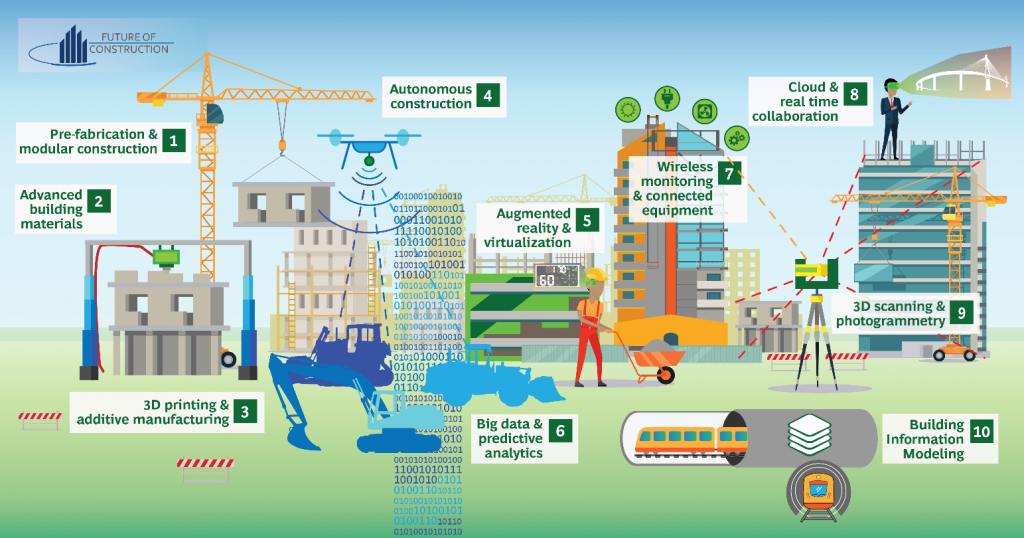Specialisation in Digitalisation in Urban Infrastructure
Prepare yourself for the digital future! Digital technologies and data are increasingly shaping the way infrastructure and environment is being designed and built. Drones, automation, robotics, artificial intelligence with computer vision and IoT are some of the technologies that are transforming the built environment.
The Specialisation in “Digitalisation in Urban Infrastructure”, offered by the Department of Civil and Environmental Engineering at NUS, will equip our students with the skills to integrate digital technologies in civil engineering to transform the design and construction of the built environment and improve the quality of urban life.

Programme Structure
Students are to complete 20 Units to be awarded with this specialisation which consists of:
- 8 Units of Core Courses including data acquisition, data analytics and digital management
- 12 Units of Technical Electives in a range of relevant sub-disciplines
8 Units of Core Courses in the following:
CE3201 Civil Engineering Analytics and Data Visualization (2 Units)
- Discover how to manage and analyse Civil Engineering data. Explore how different data representations provide different insights.
CE3202 Data Acquisition for Civil Engineering Applications (2 Units)
- Understand different types of data collected for monitoring infrastructure. Learn about different sensing technologies, its mechanisms and principles. Discover it’s applications in civil engineering!
CE3203 Optimization Methods and Algorithms for Civil Engineers (2 Units)
- Learn how computers can be used to find optimal solutions to civil engineering problems. Discover the power of algorithms in today’s infrastructure applications.
CE3204 Data Management for Civil Engineers (2 Units)
- Civil Engineers generate lots of data. Understand the concepts of managing, storing and using this data. Learn how data is structured to support civil engineering applications.
Choose any 12 Units worth from the following courses (grouped by sub-disciplines):
Intelligent Transportation & Urban Infrastructure
- CE5206 Urban Public Transportation Systems (4 Units)
- CE5208 Urban transport infrastructure management (4 Units)
- CE5209 Transportation Data Analytics and Modeling (4 Units)
Smart Structural Systems & Digital Construction
- CE5515 Structural Health Monitoring (4 Units)
- CE5113 Geotechnical Investigation & Monitoring (4 Units)
- CE5805 DfMA & Productivity Analytics (4 Units)
- CE5807 Integrated Digital Delivery (4 Units)
- CE5808 Digital Design and Construction (BIM & VDC) (4 Units)
Digital Urban Sustainability
- CE5310 Hydroinformatics (4 Units)
- CE5316 Water Resources for Smart and Liveable Cities (4 Units)
Eligibility
This specialisation is offered to new students at admission, and is also opened to existing year 1 students with exceptional academic standing. Spaces are limited to 35 students. Acceptance is competitive. Please contact the department for further enquiries.
Career Prospects
Graduates of this specialisation will be at the cutting edge of today’s built environment, able to harness advanced digital technology, while bringing about innovations that impact the built environment. There is a high demand for graduates with this area of expertise and the built environment targets to have at least 80,000 trained in digital technologies by 2025.
Testimonials
 |
Ng Jun Liang Ben Civil Engineering, Year 2 |
|
| You'll love learning Python and coding in this specialisation. The content in this specialisation is extremely useful since the Civil Engineering industry is being transformed by this digital age, and you'll find it very relatable as you start your career as a civil engineer. Do not be afraid to ask questions too, as they sharpen the mind. | ||
|
Ang Yen Li Francesca Civil Engineering, Year 2 |
 |
|
| I find the courses to be quite interesting because of the real-life applications. For example, for our data visualization course, we were tasked to create a video on the Covid-19 geographical propagation map which was very relevant. These data visualization skills could be applied to other aspects of civil engineering where graphical outputs of sensor systems (used for structural health monitoring) are generated to view real-life vibration traffic data - which was one of our assignments | ||
 |
Devin Lee Guan Seng Environmental Engineering, Year 2 |
|
| I think this specialisation will equip me with the skills to analyze and use my data for my work better in the near future. Also, being equipped with the technical know-how to handle digital technology used in the industry is good too. | ||

